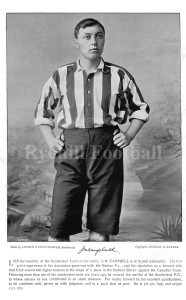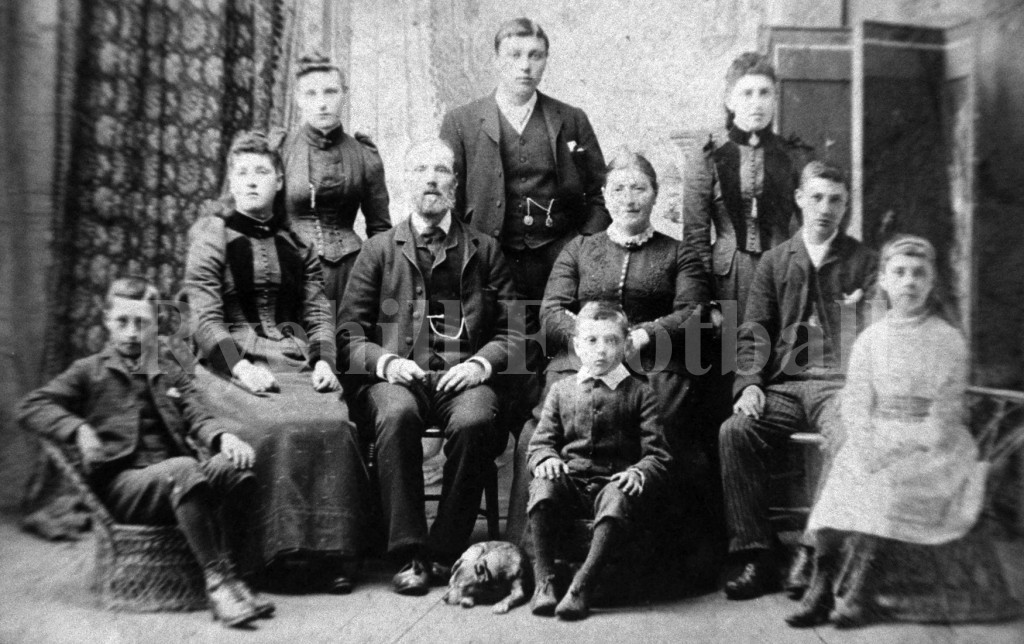Johnny Campbell With His Family In Scotland – Unknown Date
 One of the most commonly used pictures to accompany articles about the Team of all the Talents is that of Johnny Campbell, thumbs hooked into his shorts, looking as if he meant business. And for eight years in Sunderland he certainly did the business, scoring well over 200 goals in all games and being a central feature of the team that won three Championships in four years and were runners-up in between.
One of the most commonly used pictures to accompany articles about the Team of all the Talents is that of Johnny Campbell, thumbs hooked into his shorts, looking as if he meant business. And for eight years in Sunderland he certainly did the business, scoring well over 200 goals in all games and being a central feature of the team that won three Championships in four years and were runners-up in between.
John Middleton Campbell was illegitimately born in Renton, and was in the Renton side that won the Scottish Cup in 1888 and then beat English Cup holders West Brom in Glasgow in a match described as “The Championship of the World”. He would win it again in 1895 this time with Sunderland when they defeated Hearts at Tynecastle in 1895.
Samuel Tyzack signed him for Sunderland in the summer of 1889 along with John Harvie, despite competition from other English clubs. At that time Johnny was only nineteen, but he made an immediate impact in what was to be Sunderland’s last season as a non-league club.
The next summer Jimmy Millar arrived from Annbank, and the famous forward line of Scott, Millar, Campbell, Harvie and Hannah was created. For the next four years “the combination of the front rank was the envy and despair of all the teams they encountered”, and Campbell’s performance in a 6-1 thrashing of Aston Villa at Perry Barr was described as “the most brilliant seen on the ground”.
Of this forward line, Millar and Jimmy Hannah were the dribblers and creators, Johnny Campbell the lethal finisher. Of medium height and well built – his weight was to increase with the decline in his career – he had pace and dash, and could get through the toughest defence. A contemporary writer said, “I should say that he was by far the most dangerous forward individually. I have seen him repeatedly run right through a defence and shoot a goal, and I have heard backs wondering how he managed to do it.”
The 1890s were, of course, a time when charging and physical contact were the norm, though it could never be said that the Sunderland forwards achieved such feats by force alone. These were feats of staggering proportions by today’s standards: 217 goals in 57 matches in 1891-92, 100 goals in 30 League games in 1892-93, with Johnny Campbell the leading scorer in five out of the first six league seasons.
As with all great teams, the Team of all the Talents could not survive for ever. The same writer surmised “Towards the end I used to think that they overdid their passing, and gradually lost their deadliness in front of goal.” Whatever the reason (and there were also disputes within the club about players’ discipline), in his prime Johnny Campbell was a centre forward without parallel. That he never played in a home international for Scotland (though he did wear the dark blue jersey against Canada) was not down to there being better players around, but solely because at that time the Scottish FA preferred to select players from Scottish clubs.
Johnny left Sunderland at the end of the 1896-97 season, moving down a division to join a club that was very much in the shadow of the premier side in the North-East. Newcastle had good reason to be grateful for the services of Johnny Campbell, who achieved the distinction of playing in both Sunderland’s and Newcastle’s inaugural Division One fixtures, the latter after helping them to win promotion. However they did not show their gratitude, and Johnny only made one more appearance for Newcastle before leaving the game in highly acrimonious circumstances, having taken over a pub in anticipation of a career after retirement. The Newcastle directors suspended and eventually dismissed him for doing this, stating that it was against the club’s rules. Only eight years later Johnny Campbell died and was buried in Bishopwearmouth cemetery at the age of 36. Many Sunderland players of that era died young, but Johnny’s passing was one of the most widely mourned.






